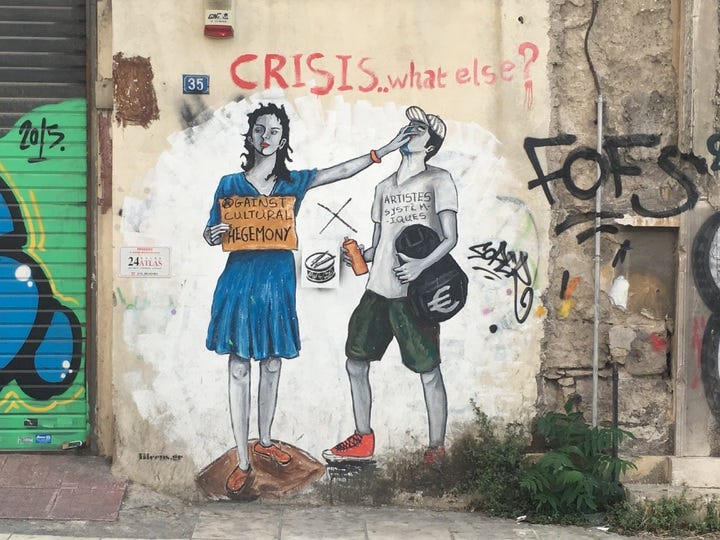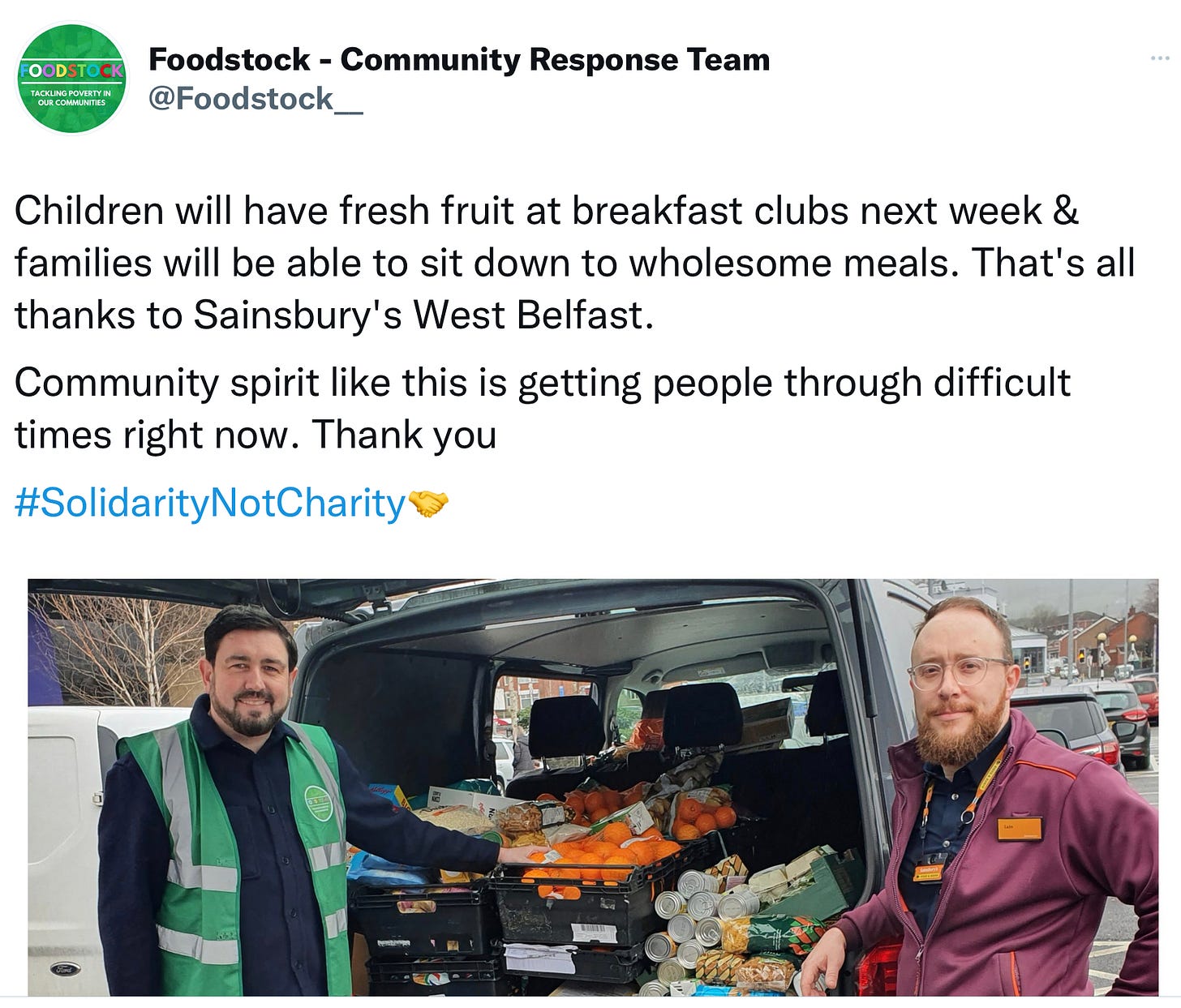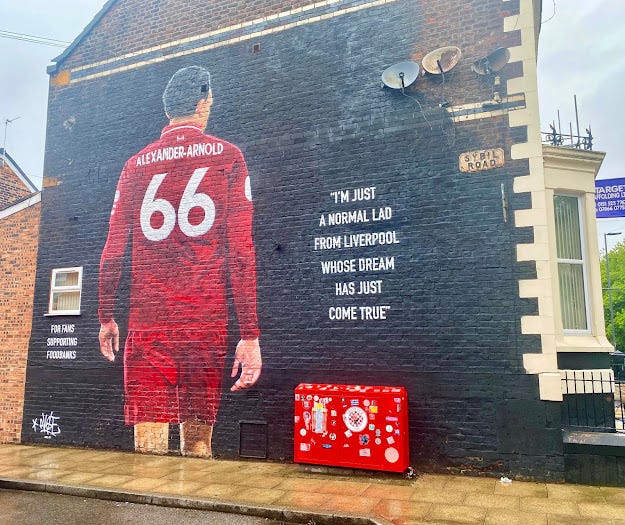10 November 2023. Crisis | Community
The problem with ‘polycrisis’. // Football fans against food poverty [# 513]
Welcome to Just Two Things, which I try to publish three days a week. Some links may also appear on my blog from time to time. Links to the main articles are in cross-heads as well as the story. A reminder that if you don’t see Just Two Things in your inbox, it might have been routed to your spam filter. Comments are open. And—have a good weekend.
1: The problem with ‘polycrisis’
I’ve been meaning for a while to discuss Jonathan Rowson’s article on whether the ‘polycrisis’ is better understood as a ‘metacrisis’, but it’s very long and also a little technical in parts, so I’ve had to think about the best way to summarise it.
Polycrisis vs metacrisis may seem like a distinction without a difference, but Rowson persuaded me that the different words have a different impact on our sense of agency in the face of crisis. ‘Metacrisis’, he argues, is more likely to give us the scope to act.
(‘Mid life crisis 3’, by Steve Johnson, via Flickr. CC BY 2.0)
Since I had pretty much exactly that discussion in a podcast recording I made this afternoon, about how we found the space to continue to act in the face of worsening drivers of change all around us, it seems a good moment to review it. (The podcast won’t be out until New Year).
So first, Rowson recognises early on that everyone might not be convinced that there is a difference here:
These prefixes that seek to qualify what kind of crisis we are in are not inert, they are psychoactive and influence our sense of possibility. It matters that we get it right.
Really?
Does it really matter?
Yes, I really think so.
But he starts with the notion of ‘crisis’. He quotes the German historian Reinhard Kosselleck (new to me) who argued that ‘crisis’ and its relationship to the idea of ‘critique’ was central to the notion of modernity.1 Building on this, Rowson says:
Our world has been created through perpetual crisis construction and crisis management, and the over-use of crisis by the powerful has been critiqued as a method of control for precisely that reason. The term applies at all scales, however, and still feels indispensable.
That link in the passage above goes to a review of a book by Janet Roitman called Anti-crisis which spells out this point about crisis as control, and is worth expanding on a bit:
In particular, she notes that when politicians, academics and scientists frame a certain situation in crisis terminology, the political debate immediately becomes more charged; indeed, simply invoking the term crisis enables some political and intellectual possibilities, while foreclosing others.
But back to Rowson again. In a long and slightly breathless sentence, which I’m quoting in full because it is impossible to break it up, he characterises some of the features of the current world and suggests that it is not surprising that talk of ‘crisis’ abounds:
We are living in a phase of an apparent shift in geological time ( Holocene to Anthropocene, Capitalocene, or Novocene ), a transformed information system that fosters addiction and division by design (the internet-enabled and algorithmically-driven smartphone especially), literally life-changing (or denaturing) technologies like gene editing and synthetic biology, and lifeworld-changing technologies like deep fakes and virtual reality, AI as a kind of enigmatic and accelerating threat multiplier , climate collapse as the nexus of systemic risk to food and water supply, and the resulting fallout in terms of bio-precarity and security risks, as well as socially corrosive levels of inequality, the palpable fragility of national economies and the absence of a competent political class. (Emphasis in original)
All of this creates a sense of of stuckness (I’m simplifying quite a complex part of the argument here, for reasons of space):
The essence of our predicament is that this relationship is now dysfunctional because we don’t quite know what crisis is asking of us, and because the world is not now changing as it needs to – mind and society are not moving with the spirit of the times.
This is why the prefix matters. In Rowson’s mind, one helps us start to get unstuck, and one doesn’t. ‘Meta’ is the helpful label here:
(I)t draws attention to interiority (meta as within) and relationality (meta as between) as spiritual features of what is typically assumed to be a political challenge, while also highlighting that a fixation with crisis may preclude other and better ways of being in the world (meta as beyond).
I’ll come back to this in a moment, and there’s a longer and more formal definition in the piece, but it’s worth pausing to spell out how Rowson charaterises the polycrisis in contrast to the metacrisis:
Polycrisis refers to the world system of systems beginning to malfunction, with escalating risks due to emerging properties in the whole being significantly more dangerous than the sum of its parts;... I believe the term is ultimately insidious because it fetishizes complexity, and amounts to a kind of performative lamentation about the world spinning out of control.
Although polycrisis was chosen by the Financial Times as the word to describe 2022, it does have some intellectual history, going back to the book Homeland Earth in 1999. Since then The Cascade Institute and the Post Carbon Institute have both tried to develop it in different ways.
But, to underline the point, it remains, essentially, a disabling idea:
In essence, polycrisis says there is a worsening geopolitical predicament confounded by the loss of intelligibility, particularly our inability to understand causal mechanisms at scale, and there is no credible conventional response in sight that is commensurate with the emergence of escalating risks to geopolitical stability.
I was struck by this distinction between the nature of ‘polycrisis’ and ‘metacrisis’ because it seemed to reflect a division that is also present in futures. Much of the business futures of the 70s, 80s and 90s was essentially ‘out there’, with a positivist view of the world that didn’t engage with values, power, or ethics.
The recent wave of futures thinking, perhaps going back to Richard Slaughter’s integral futures in the late ‘90s, instead puts the participant into the work. Values matter, ethics matter, agency matters. It is, to pick out a couple of words from Rowson’s description of ‘metacrisis’ above, about interiority and relationality.
(‘Crisis.. what else’, via pxHere. CC0 public domain.)
This piece is already long, but Rowson has a short, if slightly loaded, quiz to help tease out the difference between polycrisis and metacrisis which is worth sharing here. Yes or no answers only:
Do the world’s problems have an underlying/overarching/inherent cause that we might do something about?
Do the main ways that those with political and economic power currently try to solve problems (policy, regulation, trade, technology, economic growth) tend to make those problems worse?
Is there reason to think our historical moment is qualitatively distinct from other historical moments in a way that calls for a fundamental shift in our relationship to reality?
Should we take care to ensure that the terminology we choose to distil the essence of our global situation is as accurate and edifying as it possibly can be?
Is there something about the very idea of crisis that militates against the kinds of transformation we now need?
I’ll leave you work out which one is which.2
2: Football fans against food poverty
There’s an article at The Conversation about football fans who have been organising to fight food poverty in their communities. Fans Supporting Foodbanks (FSF) started on Merseyside, organised by Liverpool and Everton fans, and there are now more than 20 groups across the country. But it’s about a bit more than food poverty.
It’s a long article, and frankly it needed a better editor, but I’m going to pull out some of the interesting parts here.
FSF runs mobile ‘food pantries’ in areas that are under-served:
The regular food pantries are a bit like mobile food banks – mini-markets which set up in various locations across the city. These are areas which could be classified as “ food deserts ” where cheap, healthy food options are scarce... Patrons pay a fee of £3.50 for which they get a shopping basket and can choose ten ambient (long shelf-life) items. They also receive a bag of mixed vegetables and a bag of selected meat, providing a total shop worth about £25.
(The FSF logo. Photo: CC BY 4.0)
This is against a background in the UK of a significant increase in the use of foodbanks. In 2015, numbers using foodbanks topped one million for the first time. By 2022-2023 this had increased to three million users, of whom a third are children. (If you want to know more about the background to this the recent Rowntree report ‘Destitution in Britain 2023’ has the grim details.)
But many food banks are run through a system of referrals from health or social services providers, which can involve intrusive questions. Some set limits on how many times you can use the food bank in a certain period of time.
The FSF emerged in 2015 from supporters’ groups from both Liverpool and Everton football clubs—The Spirit of Shankly and The Blue Union. There’s a deep on-field rivalry, but both teams play in deeply deprived and neighbouring parts of the city. The project is self-funded, and it tries to help ‘people up, not out’:
FSF has met this aim through a successful programme of grassroots fundraising and activism which supports the successful application of the “food pantry model”. A model that champions a community atmosphere and a market format which can make the experience more positive for users.
The article, which is based on some extended participatory research as well as user surveys, catches a flavour of what that feels like when the van turns up:
Combined with music streaming from the van, along with other community activities such as book and clothes exchanges, health screenings and cooking classes, the model serves to remove the stigma around food bank usage and helps people reconnect with their community. As one of the users tells us when asked how they would describe their pantry: “(It’s) friendly; supportive. (People are) always asking where I’ve been when I’ve not been down for a couple of weeks.”
FSF now runs six pantries in different parts of Liverpool, and a Sunday breakfast club in Birkenhead, just across the Mersey. Two-fifths of the users are over 65, and almost three-quarters are retired or unemployed. Almost two-thirds have been coming to the pantry for more than a year:
Our survey was an attempt at capturing people’s experience and one of the hardest questions was, “how do you feel when you are here?”. To assist a list of emotions was offered such as anger, fear, embarrassment, joy, acceptance, and sadness. Somewhat surprisingly the most common answer was joy (36%), followed by acceptance (33%)... As (a) user told us:
”It’s eye-opening. A year ago, it was lifesaving. It was hard to go to initially but it has helped me keep my head above water. I’m really grateful for the service. Been part of allowing me to get back on track.”
It’s not accidental that FSF started in Liverpool. The Hillsborough disaster and the campaign for justice by the families both politicised fans and also created bonds between the supporters of both Liverpool and Everton. Ian Byrne MP, who used to run The Spirit of Shankly supporters’ group and was a co-founder of Fans Supporting Foodbanks, told the researchers,
Hillsborough changed everything … your political awareness goes off the scale and you see injustices everywhere … you start contemplating the power of football.
And it’s not lost on the fans that they’re running a service that is designed to deal with destitution while supporting football teams which play in one of the richest leagues in the world. The article quotes Robbie Daniels, an Everton fan who was co-founder of FSF:
There’s a massive disparity and the clubs may have thought they were doing enough through their own charities, but we’ve shown them fans collecting for other fans of the club who are starving, and they have started to listen and get involved.
In some ways this disparity, more generally, has created new forms of activism among fans. Many of the grassroots fans’ groups emerged through opposition to some of the greed that they saw in their club’s owners, in campaigns such as ‘Twenty’s Plenty’ (against overpriced away tickets) and more recently against the idea of the European Super League. A campaign against excessive charges to watch away games raised the initial funds to buy the first two vans for FSF in Liverpool.
This has created new forms of solidarity between the fans of different clubs, which has been amplified by relationships between different FSF groups:
Often travelling to away games, the FSF crew from Liverpool utilises these strengthening networks to take donations to the collections of other fan groups. The symbolism of, for example, Liverpool fans bringing food to donate to the Manchester City fans is meaningful and has spurred other groups to follow suit. As Donna Scully, a Liverpool fan in her 50s and FSF volunteer, told us:
”The deprivation is everywhere, and none of us (fans) at any club can say that it’s not impacting my community … it’s in every corner of this country.”
Indeed the slogan of the Belfast FSF group, Foodstock, which works across both religious communities, is ‘Solidarity not Charity’.
One of the criticisms of foodbanks is that they institutionalise poverty, dealing with symptoms rather than causes. FSF has connected their movement to a radical demand for the ‘right to food’. (I’ve touched on this issue here before). This campaign, led by the MP Ian Byrne, has support from a number of city councils and the union, Unite:
Its goals include, bringing in universal free school meals for every child, rolling out “community kitchens” in much-needed areas and encouraging the government to reveal their plans for spending on food.
The articulate work of the Manchester United player Marcus Rashford campaigning on child hunger during the pandemic perhaps pointed some of the way here, but the researchers observe that it is the first time that football fans have connected themselves to a wider social justice objective:
On a clear day in late September 2023, we joined the March for Hunger that wound its way through Liverpool led by local school children. Parallel marches took place in London and Belfast demanding universal free school meals. Among the crowds were community and church groups, individual activists, and of course football fans, who added the voice of the terraces to the universal chant demanding the right to food.
The researchers suggest that this represents football fans seeing themselves differently—and a wider form of participation.
(Trent Alexander-Arnold’s mural in Liverpool, which celebrates Fans Supporting Foodbanks—bottom left. Photo: Stuart Hodgson, aka The Hiking Photographer)
j2t#513
If you are enjoying Just Two Things, please do send it on to a friend or colleague.
Bo Isenberg writes: “Critique expresses the possibility that everything could have been different. By doing so, critique puts things and the order of things in a state of crisis – institutions, meanings, relationships, mental and cultural dispositions. ... It has been said that critique is a genuinely modern disposition, just as crisis is a genuinely modern societal and mental state.”
But if you’re stuck: if you mostly answered ‘Yes’, you’re at the metacrisis end of the spectrum. Mostly ‘no’, and you’re more polycrisis.





